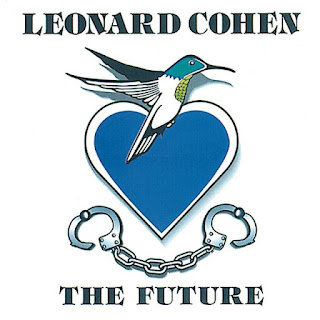 |
| 1992 |
My first
Leonard Cohen album.
Listening to it produced a bundle of mixed emotions for me then — still can, sometimes.
Buying it seemed necessary, at the time. It wasn’t getting much airplay on the radio, except for CBC. Television seemed to love him — not just the Corporation (predictably enough) but Much Music and various music video shows. So did magazines, particularly the hippest of the hip —
GQ landed
Mordecai Richler as a contributor, but
Details landed Leonard Cohen. He looked good — no, he looked
great, especially for a 58-year-old.
And he wore 31-year-old
Rebecca DeMornay like an exquisite silk tie.
That’s where my problems started.
The 90s were a crappy time to be in your 20s. “Just say ‘No!’” was Official Policy, extended to an increasingly wider purview of activity. So if I was making Sunday morning scrambled eggs, and Leonard was singing,
“She comes to you light as the breeze” my only reasonable response was to regard my flatmate’s bloodshot eyes through my own, and roll in chorus.
Whatever you say, Leonard.
Under those conditions listening to
The Future could feel like a protracted session of “I’m Leonard Cohen — and you’re not.”
All the lousy little poets coming round
Trying to sound like Charlie Manson
The truth was THIS lousy little poet was trying to sound like Leonard Cohen, but — gormless and luckless at 26 — whingeing like Mark David Chapman instead.
Yep, I was jealous. But let me say this about that: if, in three years time, you spot me looking like the cat who swallowed the canary while a lovely 31-year-old gal fawns over me, you have my full permission to let me know exactly what you think.
And yet.
Seeing Cohen perform the following year seemed necessary at the time, as well — particularly since the concert landed on my 27th birthday.
The light-show, the sound, the poetry and song were all a carefully curated affair. “Anthem” was his third or fourth song on the setlist. Cohen took the mic, confused the third stanza with the second, registered the mistake midway but finished the verse regardless. He crept out of the spotlight and stood in the shadows while the band and singers played on and brought it back to the intro again. Then he walked back into the spotlight, and the song was sung as written.
When it was over he quipped, “I will leave that for the scholars of my work to figure out.”
At that moment I realized I did not want to be Leonard Cohen, not really. And I figured at that moment he probably didn’t want to be Leonard Cohen either.
There were probably a lot of moments like that in his life — though I doubt he held any moments when he wished he were me.
 |
| Living long enough to enjoy medical cannabis, and other consolations of late-in-life frailty. |
Female counterweight: Cohen’s (relatively) early paramour
Joni Mitchell released an album in '94 that was well-regarded. I enjoyed it, but will opt instead for her most recent album — 2006’s
Shine.
And finally...


























